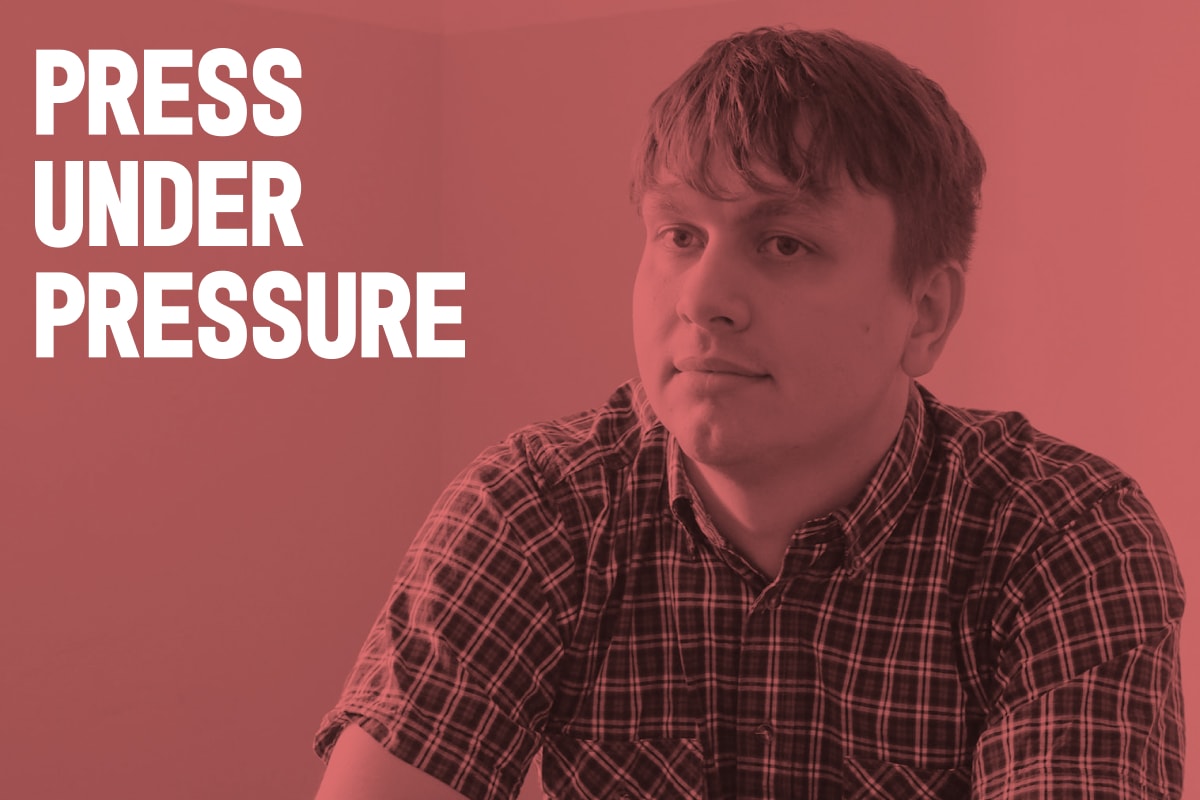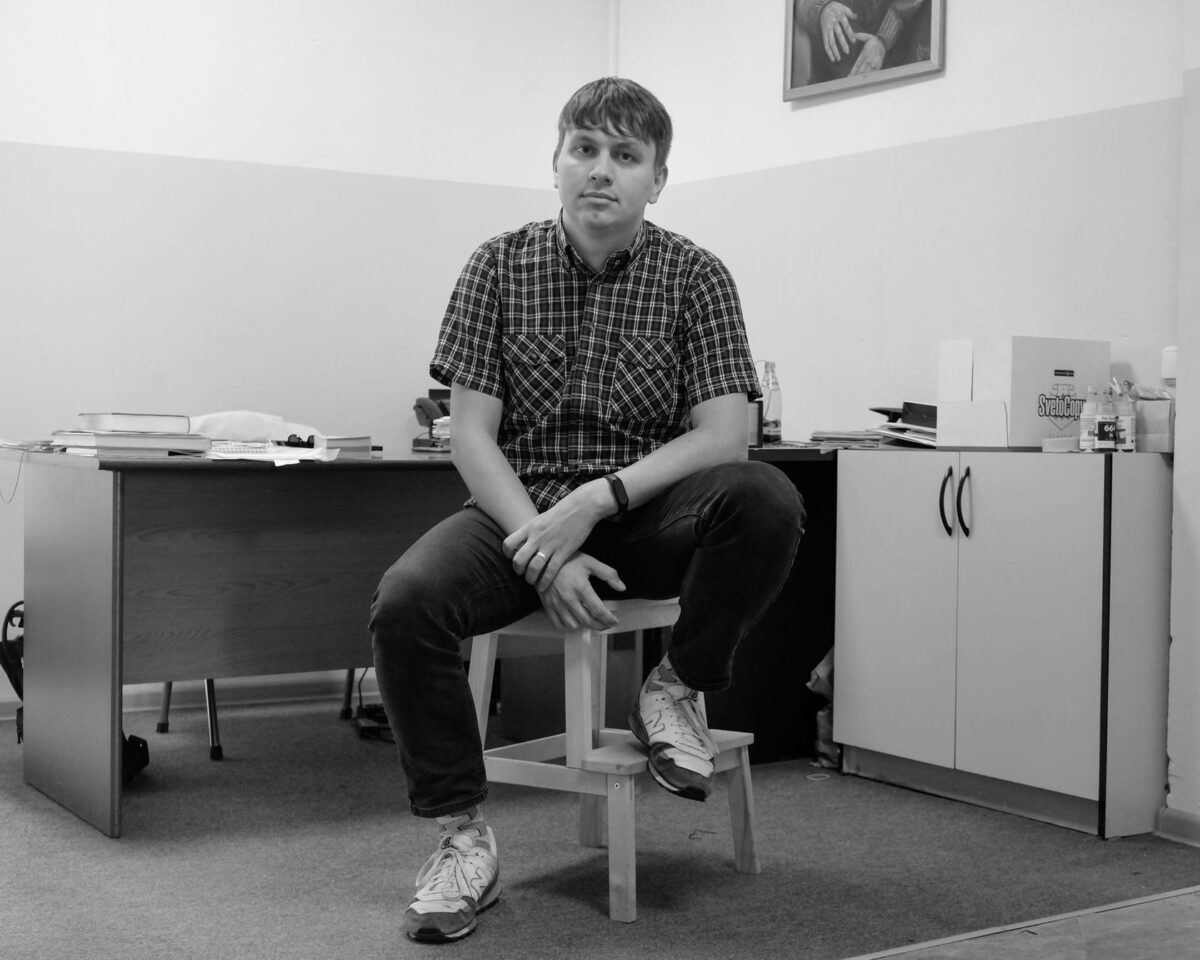
On August 11, 2020 at about 2 am Yahor Martsinovich was detained in his car near the Pushkinskaya metro station in Minsk. He came to pick up his wife after work. At the time of his arrest, clashes and demonstrations were no longer taking place. In addition, the fact Yahor had a press card was ignored.
For more than 36 hours, neither family nor colleagues knew what had happened to the journalist. In the end, on August 12, he turned up in the detention center in Zhodino, and was released. Yahor Martsinovich was told that he was released thanks to the decision of the Minister of Internal Affairs, Yuriy Karayev.
My story began on 10 August. I had spent the whole day dealing with administrative matters. So I had missed everything that happened that day at Pushkinskaya. I finished my work after midnight and started to help our journalists by giving a ride home to those who did not have a car.
I picked up a colleague, and on our way, we picked up a demonstrator. When he got out of the car – it was in Olshevsky Street – we saw a man lying on the ground. His leg was clearly broken. The demonstrator decided to help him, and we drove on.
After we had arrived at my colleague’s place, I left for another colleague, who was waiting for me in a coffee house that by then had closed. I was driving through the peaceful city. I could not imagine the level of aggression it contained. When I reached Pushkinskaya metro station, I saw something like a searchlight shining from far away. I stopped the car. The traffic police officer told me to drive into the yard area. I did so, but bumped into another checkpoint. They asked me to show my phone and open the trunk. I showed them and drove on. And then there was another checkpoint.
A man with a rifle approached me and ordered me to step out of the car. But I was not worried. I was a journalist, I had my credentials. The man saw the name of the newspaper, Nasha Niva, heard me talk Belarusian, and was really happy about it: “That’s who we need! Get out!” he said.
I was not even allowed to get the key out of the ignition. The car remained standing there where I had stopped it. By the way, jumping ahead, I can say that nothing was stolen from my vehicle, although all the windows were open, and there were two laptops in the back seat, mine and my colleague’s.
Then they started throwing us from one paddy wagon to another. In the first one, I still had my news reporter status: I was not thrown to the floor, but allowed to sit down. I had to step over puddles of blood or something that looked a lot like blood. I tried not to tread on the people lying on the floor.
I felt like I was at a war, and the occupation forces had arrived. My brain refused to register that I was in Belarus. Next to me there was a guy and a girl who had seen what was going on at Pushkinskaya on the internet and had come there with bandages and medicines to provide aid.
Then we were taken out of that paddy wagon and put down with our faces to the ground. There, however, I had the same status as everyone else. A riot policeman came up and kicked me, because my legs were too wide apart. Then another one came and kicked me again, because my legs were no longer wide enough apart. They shouted, “You wanted a revolution? You’ll have one!”
There were about 20 of us – all were loaded into another paddy wagon and taken somewhere. We still had our phones, and, looking at the map, we realized that we were on our way to Okrestina. But then, listening to the conversation of the police guys, we understood that there was no vacant space there.
On our way, I managed to send a SOS message. But I did not have geolocation on, so my emergency contacts only received a text message that I was in trouble. Without a link to Google maps.
In the end, we were brought to a police station, but there was no room there either. So we were taken to the yard behind the building and told to get down with our faces on the grass. The policemen wrote down our personal data about three times.
I asked them to tell the press service that I was a journalist. But nobody did, of course. I was interrogated by a woman. Someone was beaten up next to me, but she did not even react to it: she did not care.
We lay down the whole night long with zip ties on our wrists. Almost all of us chose to keep silent. But there was a man about 40 years of age, who would talk all the time, telling them they should be ashamed of themselves. He told them he was an Afghan War veteran, and they could not break him down. He said he was stronger both physically and mentally. They threatened to break his arms and legs, but in the end, he made them give up and take off the ties from his wrists. Then he asked them to do the same for us, but it did not work this time.
In the second half of the night, policemen with a bunch of printed reports came. All of them were exactly the same: all of us were detained at three in the morning, all of us had allegedly been chanting protest slogans. The policemen made it clear that if someone did not sign the report, they would be beaten. I wrote on this piece of paper that I was driving a car, and had not participated in the rallies.
Then the riot police left, and only the regular policemen remained with us. They treated us better. They would let us go to the toilet. When we came back, they would put the ties back on our hands more loosely.

Yahor Martsinovich
In the morning, they started to load us into the paddy wagon once again. There were 30 of us in a vehicle designed for eight. There was no fresh air. Older people nearly fainted due to the lack of oxygen.
The riot police guy said that if someone started to cry, he would open a cell at random and beat up whoever was in it.
There were also stories from parallel, surreal universe: I heard a riot police guy talk on the phone, probably with his wife: “Baby, I’m okay, I’ll be home soon”. These guys complained to each other how miserable and hungry they were, and how much work they had to do.
On our way, we heard the honking of horns of cars passing by, supporting the protestors, and it was very nice. They brought us to Zhodino. Somehow it took us about three hours to travel 50 kilometres.
We had to stand in a large queue to complete the necessary formalities. And then we had to go down a corridor, where truncheons were used to beat people. Guys in the cell told us that they had been less lucky: their paddy wagon was met by dogs, which were set upon them.
We spent some time in the yard, and then were taken to the cells. But before that, we had to pass through body search. It was a very humiliating process. You had to take all your clothes off and squat a couple of times, so that they could see that you are not hiding anything inside yourself.
I found myself in a cell with 28 guys and 12 bunks. There I met guys detained on August 9, and most of all they wanted information. As I was detained on 10 August, I was able to tell them the update. Not all of the detainees had participated in the rallies, but everyone held the same views.
In the morning, they gave us some disgusting pearl barley porridge, which caused everyone stomach problems. At noon on the next day, I heard someone calling out my surname. I came out crouching to the ground, with my arms behind my back. Over the time I spent there, I developed the habit to do so if someone from the forces was addressing me.
The man who had called me asked me if I was a journalist. I said that I was the editor-in-chief of Nasha Niva. “Is that a military newspaper? If not, what kind of important person you are, being searched for at all the detention centres?» That guy said I was being released.
It turned out that I could not be found for a very long time because I was not on the lists. I do not think it was done on purpose. It’s just that here was simply chaos.
I returned to the cell and told my cellmates everything. They were very happy that I was being released and started telling me their phone numbers, so that I could call their relatives. We came up with a way to put them down, so I got out of jail with 20 recorded phone numbers of my cellmates’ relatives.
It was the toughest emotional moment when I dialled those numbers later in the evening. When you sit in a cell, you do not want to cry. You just know that you have to hold on. But when you call wives, mothers, sisters, and they tell you that they will pray for you because you brought them good news – that their dear ones are in prison…
I had expected that when I got out, someone from the volunteers would take me to the station, and I would get home.
It turned out a car from the Ministry of Internal Affairs was waiting for me, and they had a special order to take me to the Ministry for a talk. And only after that would they let me go. In the car, I was asked to lie on the back seat when we passed the checkpoints and the volunteer camp. So that the volunteers did not see me. I had to agree.
At the Ministry, they told me, “Minister Karayev treats journalists with great respect: it was a mistake, so let’s pretend this never happened.”
Terms and conditions
Partial or full reprint is permitted subject to following terms of use.
An active direct hyperlink to the original publication is required. The link must be placed in the header of the reprinted material, in the lead or the first paragraph.
Reprints, whether in full or in part, must not make changes to the text, titles, or copyrighted photographs.
When reprinting materials from this page, attribution must be given to the Press Club Belarus “Press under Pressure” project, collecting evidence of repression against independent media and journalists in Belarus.